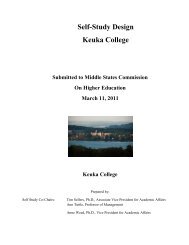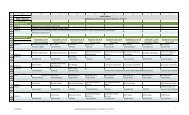final version of the self-study document - Keuka College's Middle ...
final version of the self-study document - Keuka College's Middle ...
final version of the self-study document - Keuka College's Middle ...
You also want an ePaper? Increase the reach of your titles
YUMPU automatically turns print PDFs into web optimized ePapers that Google loves.
Credit for Prior Learning<br />
<strong>Keuka</strong> College awards academic credit for prior learning in a variety <strong>of</strong> ways. Transfer students<br />
may submit college transcripts for evaluation <strong>of</strong> transfer credit to <strong>the</strong>ir academic advisor or<br />
transfer counselor (College Record, pg. 48, ASAP Undergraduate Handbook, pg. 10, <strong>Keuka</strong><br />
College Faculty Handbook, pg. H2). In addition to evaluation <strong>of</strong> transfer credit, formalized<br />
articulation agreements exist between <strong>Keuka</strong> College and several community colleges within<br />
New York State; a listing <strong>of</strong> <strong>the</strong>se schools can be found on p. 48 <strong>of</strong> <strong>the</strong> <strong>Keuka</strong> College Record.<br />
Credit by examination is also awarded to students at <strong>Keuka</strong> College (<strong>Keuka</strong> College Record, pg.<br />
12, 48, ASAP Undergraduate Handbook, pg. 10, <strong>Keuka</strong> College Faculty Handbook, pg. H2).<br />
College credit can be awarded to students who successfully complete College Level Examination<br />
Program (CLEP) exams, Advanced Placement (AP) Program courses <strong>of</strong> <strong>the</strong> College Entrance<br />
Examination Board, New York State Regents College Examinations (RCE), International<br />
Baccalaureate Examinations (IB), programs sponsored by <strong>the</strong> non-collegiate organizations and<br />
<strong>the</strong> Armed Forces, such as American Council on Education’s Office on Educational Credit<br />
(ACE), and DANTES Subject Standardized Tests <strong>of</strong>fered by Service Members Opportunity<br />
Colleges (SMOC). Official transcripts are required for evaluation <strong>of</strong> credit by examination. The<br />
transcripts are reviewed by <strong>the</strong> Registrar and appropriate credit is awarded.<br />
College credit may also be awarded to students who have successfully completed programs<br />
recognized by <strong>the</strong> National Program for Non-Collegiate Sponsored Instruction (PONSI) or<br />
National College Credit Recommendation Service (NCCRS).<br />
<strong>Keuka</strong> College does not have a formalized Prior Learning Assessment (PLA) program at this<br />
time. At <strong>the</strong> request <strong>of</strong> <strong>the</strong> College’s Instruction Committee, an ad-hoc PLA working group<br />
(comprised <strong>of</strong> three full time faculty members, <strong>the</strong> Dean <strong>of</strong> <strong>the</strong> Center for Experiential Learning,<br />
<strong>the</strong> Executive Director <strong>of</strong> Administration, Curriculum and Assessment at <strong>the</strong> Center for<br />
Pr<strong>of</strong>essional Studies and <strong>the</strong> Associate Director for <strong>the</strong> Center for Experiential Learning) was<br />
formed in 2009 to review and make recommendations for a formalized Prior Learning<br />
Assessment process at <strong>Keuka</strong> College. The PLA working group provided recommendations to<br />
<strong>the</strong> Instruction Committee in 2010, but <strong>the</strong> proposal did not gain sufficient support by <strong>the</strong><br />
Instruction Committee to be forwarded to <strong>the</strong> faculty for consideration<br />
<strong>Keuka</strong> does, however, provide to its students <strong>the</strong> opportunity to be granted Field Period Credit<br />
for Prior Experience. Information is available to students in <strong>the</strong> <strong>Keuka</strong> College Record (p. 61).<br />
As more fully detailed in <strong>the</strong> Faculty Handbook (section I, pp. 10-13), to be eligible, a student<br />
“must be out <strong>of</strong> high school for four or more years or have four or more years’ interruption in<br />
post-secondary education”; <strong>the</strong> experience for which <strong>the</strong> student seeks credit must be one “in<br />
which [<strong>the</strong>] student is in direct contact with <strong>the</strong> subject being studied;” and <strong>the</strong> student must<br />
assemble a portfolio to be evaluated by <strong>the</strong> Prior Experiential Learning (PEL) Committee. The<br />
portfolio “<strong>document</strong>s a process by which prior experiences are translated into skills, knowledge,<br />
competencies and insights. The portfolio is a compilation <strong>of</strong> information about a past experience<br />
and a critical assessment <strong>of</strong> <strong>the</strong> learning that took place as a result <strong>of</strong> it” (I, 11). The PEL process<br />
described in <strong>the</strong> Faculty Handbook also identifies how a student can <strong>document</strong> a prior learning<br />
experience, explains what must be included in <strong>the</strong> required analytical essay, and notes that <strong>the</strong><br />
student must present orally his or her work to <strong>the</strong> PEL Committee. Detailed published<br />
Page 36 <strong>of</strong> 39 Chapter 6: Faculty, Ed Offerings & GenEd




